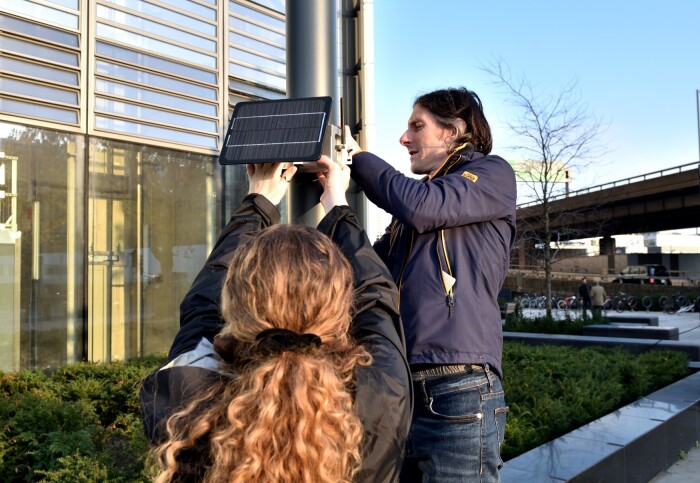Breathe London: Final round of community groups to receive free air sensors

The third and final round of London community groups which will receive free sensors to monitor and tackle local air pollution have been selected.
As part of the Breathe London Community Programme, 20 additional groups will have the opportunity to measure air quality, with assistance from Imperial College London researchers, in their local area.
Breathe London, which is supported by the Mayor of London and Bloomberg Philanthropies, and delivered by researchers from Imperial’s Environmental Research Group with support from The Social Innovation Partnership, empowers communities across London to advance actions on air quality. The programme supports groups living in areas impacted by poor air quality and with limited access to green spaces with equipment to track their exposure to harmful pollution and raise awareness of the importance of clean air.
"We have already learned so much about the importance of clean air to communities and I’m delighted that a further 20 groups will be empowered to generate their own local evidence and impact." Dr Ben Barratt School of Public Health
Poor air quality has been shown to have many health impacts including increased risk of dementia, lung cancer and low birth weight. It can also stunt children’s lungs and worsen chronic illnesses such as asthma.
The programme aims to reach groups with a passion for monitoring and improving air quality in their area, particularly those in more deprived areas who face higher exposures than those in less deprived areas.
It is part of the wider Breathe London Network - which receives investment from the Mayor and Bloomberg Philanthropies - that monitors pollution at over 400 locations across London, prioritising schools, hospitals and locations chosen by community groups, along with cultural institutions and museums.
Breathe London has already awarded 40 sensors to community groups since 2021. The participating groups have received support from the Environmental Research Group with interpreting real-time air quality data, including measurements of small particulate matter (PM2.5) and nitrogen dioxide (NO2), both of which have been shown to be harmful to health. Data from all the sensors in the programme is available in near real-time, for all Londoners to see, free on the Breathe London website.
The participants for this final round of the programme include local business groups, residents' associations, youth clubs, parents’ groups and a performing arts academy.
Antha Williams, who leads Environment Programs at Bloomberg Philanthropies, said: “Air pollution is detrimental to people’s health and livelihoods, especially for children and those who suffer from chronic illnesses. Providing community groups with access to accurate, localized, real-time air quality data can provide them with the insights they need to act and support effective change. Bloomberg Philanthropies is proud to partner with the Mayor of London and Imperial’s Environmental Research Group to award sensors through this initiative and continue supporting efforts to raise awareness and improve air quality across London.”

Shirley Rodrigues, London Deputy Mayor for Environment and Energy, said: “It’s great to be working with Bloomberg Philanthropies and Imperial’s Environmental Research Group on this important initiative once again.
“Air pollution prematurely kills around 4,000 Londoners each year and causes increased risk of illnesses such as asthma, lung disease, dementia, and cancer.
“We know Londoners want to be more proactive in tackling air pollution locally and the Breathe London Community Programme empowers them to do this. By providing community groups with free sensors to monitor the air quality in their local area, we can help them take action to reduce air pollution and raise awareness of the importance of clean air for all.”
Dr Ben Barratt, Reader in Environmental Exposures & Public Health at Imperial College London, said: “The passion and energy shown by the 40 community groups already supported in this innovative programme is inspiring. We have already learned so much about the importance of clean air to communities and I’m delighted that a further 20 groups will be empowered to generate their own local evidence and impact.”
Shadi from the Willesden Green Town Team, one of the groups selected for this round, said: “The Breathe London Node will be an incredibly important resource for Willesden Green Town Team in our drive towards tackling air pollution in Willesden Green. While we know anecdotally that the area suffers poor air quality as a result of heavy traffic congestion, construction and other light industry, we are lacking more scientific evidence.
“The Breathe London Node will provide data that will enable us to better understand the problem, lobby for change and tackle it more effectively through our greening and other targeted projects, for the wellbeing of the entire community.”
The Breathe London Network is supported by the Mayor of London and Bloomberg Philanthropies and is managed by the Environmental Research Group at Imperial College London. For more information about the project, please visit: https://www.breathelondon.org.
Article text (excluding photos or graphics) © Imperial College London.
Photos and graphics subject to third party copyright used with permission or © Imperial College London.
Reporter
Conrad Duncan
Communications Division